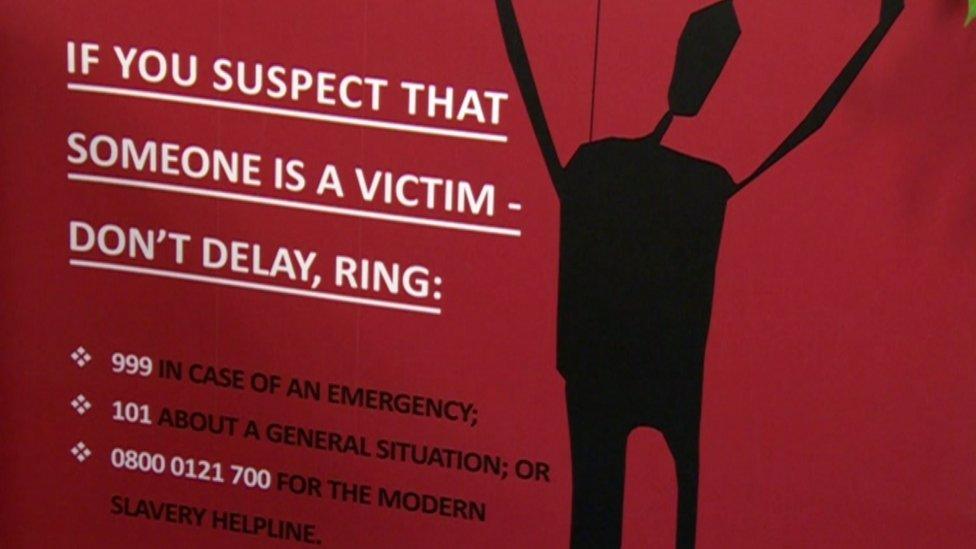PSNI investigated 59 slavery/human trafficking cases last year
- Published

Law enforcement agencies have appealed for public help to identify victims and suspects
Almost 60 cases of suspected modern slavery and/or human trafficking were investigated by the Police Service of Northern Ireland (PSNI) last year.
A total of 59 potential victims were identified in Northern Ireland through the UK-wide (NRM), set up to support those at risk.
The Department of Justice said it was a "significant increase" on the previous year when 36 such cases were examined.
The data forms part of the department's .
No convictions
"Sadly, some of the victims who are being abused, exploited and denied their human rights can be found in our local cities, towns, villages and rural areas," the department said in a statement.
The strategy states that during the 2018/19 financial year, officers from the PSNI's Modern Slavery and Human Trafficking Unit (MSHTU) made 11 arrests, compared to eight arrests during the previous 12-month period.
One person was charged with modern slavery/human trafficking-related offences during 2018/19, and three others were reported to the Public Prosecution Service.
No convictions for this type of offence were secured in Northern Ireland throughout the course of last year.
Public vigilance
However, the strategy document states that two people who had faced prosecution for human trafficking offences were subsequently convicted of "other serious offences".
The Department of Justice said there was "no quick fix" to the complex challenges posed by modern slavery and it appealed for the public's help in identifying people at risk of exploitation.
"We all have a role to play to ensure we have a safe community where there is no place for modern slavery and human trafficking abuses to take place," said its director of safer communities, Anthony Harbinson.
"Law enforcement and other partner organisations are making a difference but need the support and vigilance of the public in general."
Mr Harbinson called for a "whole societal approach" and said this was central to the department's latest strategy document.
"Working in tandem, we can improve the ways we pursue the criminals who are exploiting vulnerable people," he said.
"We can develop how we protect and support victims and target efforts to prevent others from falling prey to the criminals involved in this appalling crime."
The 2019 -2020 modern slavery strategy is the third such document to be published in Northern Ireland.
Its strategic priorities are summed up with the phrase "pursue, protect and prevent."
The aim is to pursue offenders and bring them to justice; protect and support victims of slavery and trafficking and prevent the circumstances which cause people to become vulnerable to exploitation in the first place.
- Published5 November 2018
- Published10 August 2017
- Published21 July 2015